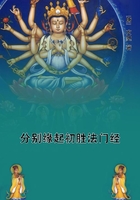It cannot therefore be alleged 'that, as one impression is found to be overpowered by another while we wake, the strongest only of the simultaneous impressions furnishing an idea to the mind; so the whole set of simultaneous impressions during sleep may be overpowered by some indisposition of the sensorium, and entirely fail of its effect'. For, first, the cases are altogether different. From the explication above given, it appeared that not one of the impressions was really lost, but tended, though in a very limited degree, to modify the predominant impression. Secondly, nothing can be more absurd than this supposition. Sleep ought, according to this scheme, to cease of itself after the expiration of a certain term, but to be incapable of interruption from any experiment I might make upon the sleeper. To what purpose call or shake him? This act evinces my knowledge, and its success the truth of my knowledge, that he is in a state susceptible of impression. But, if susceptible of impression, then impressed, by bedclothes, etc. Shall we say, 'that it requires an impression of a certain magnitude to excite the sensorium'? But a dock shall strike in the room and not wake him, when a voice of a much lower key produces that effect. What is the precise degree of magnitude necessary? We actually find the ineffectual calls that are addressed to us, as well as various other sounds, occasionally mixing with our dreams, without our being aware from whence these new perceptions arose. Thus it appears that every, the most minute, impression that is made upon our bodies in a state of sleep or deliquium is conveyed to the mind, however faint may be its effect, or however it may be overpowered and swallowed up by other sensations or circumstances.
Let it however be observed that the question whether the mind always thinks is altogether different from the question, which has sometimes been confounded with it, whether a sleeping man always dreams. The arguments here adduced seem conclusive as to the first question, but there is some reason to believe that there have been men who never once dreamed in the whole course of their lives.
To apply these observations. If a number of impressions acting upon the mind may come to us so blended as to make up one thought or perception, why may not one thought, in cases where the mind acts as a principle, produce a variety of motions? It has already been shown that there is no essential difference between the two cases. The mind is completely passive in both.
Is there any sufficient reason to show that, though it be possible for one substance, considered as the recipient of effects, to be the subject of a variety of simultaneous impressions, yet it is impossible for one substance, considered as a cause, to produce a variety of simultaneous motions? If it be granted that there is not, if the mere modification of a thought designing a motion in chief (a cry, for example, or a motion of the limbs), may produce a secondary motion, then it must perhaps further be confessed possible for that modification which my first thought produced in my second to carry on the motion, even though the second thought be upon a subject altogether different.
The consequences which seem deducible from this theory of mind are sufficiently memorable. By showing the extreme subtlety and simplicity of thought, it removes many of the difficulties that might otherwise rest upon its finer and more evanescent operations. If thought, in order to be the source of animal motion, need not have either the nature of volition, or the concomitant of consciousness, and if a single thought may become a complex source, and produce a variety of motions, it will then become exceedingly difficult to trace its operations, or to discover any circumstances in a particular instance of animal motion which can sufficiently indicate that thought was not the principle of its production, and by that means supersede the force of the general arguments adduced in the beginning of this chapter.
Hence therefore it appears that all those motions which are observed to exist in substances having perception, and which are not to be discovered in substances of any other species, may reasonably be suspected to have thought, the distinguishing peculiarity of such substances, for their source.














